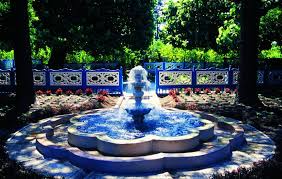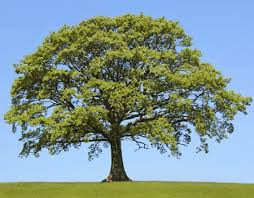After finishing this piece, I learned of the passing of a great pillar of the Canadian Baha’i community, not to mention an internationally renowned painter. His name was Otto Donald Rogers, “Don” to most who knew him. He was a quietly magnificent human being, and I’d like to retroactively offer this as a small tribute to a great man. Peace to his family and friends.
[12-minute read]
A rather different (shorter) version of this piece appears at the Baha’i Teachings website: click here for Part 1, here for Part 2.
Maybe you’ve been obsessing about the NHL or NBA playoffs. (No Canadian teams left in the quest for the hockey grail. No LeBron, no more Spurs.) Or wondering if spring will ever come. (Spoiler: it will. It’s underway. Just ask flood victims all over everywhere, but don’t mention climate change. That would be rude!) But for the Baha’is, it’s coming near the end of the “Most Great Festival” of the Baha’i calendar, and I’m all in.

This is not the original Najibiyyih Garden that Baha’u’llah called Paradise, but it evokes the same spirit.
This festival is called “Ridván”, an Arabic word meaning “paradise”, and the best my Canadian mouth can manage is something like ‘Rez-VAHN’. It’s a 12-day period that celebrates the public “mission statement” of the Faith’s founder, Bahá’u’lláh, in a Baghdad garden in 1863. This Persian nobleman, already stripped of wealth and social status and banished from his homeland, was turning a supposedly humiliating further exile into, well, a mighty big party now celebrated by millions around the globe. It’s Day 11. Two nights ago I prayed and partied with a small group not far from my house. I’ll do it again tomorrow night on Day 12, but on April 21, I joined in with a big crowd of Baha’is and their friends for the Big Ridvan Opening, where we were invited to consider how the Baha’i community got from 1863 Baghdad obscurity to the world-wide reach it has today. I’ve been trying to follow Baha’u’llah’s mighty System of knowledge and practice for a long time now. Sometimes it feels I haven’t gotten very far, but I’m still walking, and the Baha’i Big Picture is bright and ever-developing.
Anyway, it all got me thinking about histories: my own, that of the Baha’i community over the past century and a half, and even of earlier crossings into New Millennium territory.
And I thought: I would have made a very poor 1st– or 2nd-century Christian. I would’ve wanted the Kingdom to come NOW! But the growth of Christianity was slow, and the times were confusing. Heck, Pope Gregory wouldn’t be born for centuries, so the Gregorian calendar that dates our lives based on Jesus’s life hadn’t been invented; 100 years after Christ, the word “Christian” was just beginning to distinguish this tiny community from the many other Jewish cults and sects that had arisen. Even 300 years after the life of Jesus Christ, His followers were found only in tiny pockets in what we call the “Middle East”¹, Turkey, northern Africa and southern Europe, basically within a few donkey-days journey of the Mediterranean Sea. They were just beginning to organize their scriptures and get their doctrines and dogmas together, 325 years after Christ’s life, and the Christians wouldn’t become a major population even in the Mediterranean region until the 6th century. Today, it’s the most widespread religion in the world, of course, and we all take its supernatural degree of influence and prestige for granted. But I would have been so impatient as an early Christian!
¹ Ever noticed how Eurocentric that term is? As if everyplace should be measured from London or Paris (which, for many centuries, it was.)
So listen: when I joined the Baha’i community as a 1970s teenager, I began to wonder, Why are other faith groups, often younger than we are, seeming to grow so much faster than we are? I was noticing the Hare Krishna chants on Toronto streets, or the sudden North American splash, in news media and in recruitment, of the Unification Church, the so-called “Moonies”. I wasn’t tempted to join them, or even emulate their methods, but their bursts of public prominence bugged me. A wise Baha’i elder answered our youthful questions in his deep, heavily accented but utterly logical way. (If you want to channel the voice of Dr. Danesh, imagine American diplomat Henry Kissinger, but with a Persian rather than a German accent, and with a devotion to the psychology of peace and justice rather than to strategies of conflict.) He calmly explained it this way: Think about what we are trying to grow. If you look at two plants in their first season of growth – one of them a pumpkin, one of them an oak tree – your conclusion might be easy. The pumpkin is obviously more impressive, vines and bright flowers and, within months, gigantic orange fruits! Meanwhile, the oak looks like a tender, fruitless twig. The community of Baha’u’llah is growing like an oak tree; as impressive as pumpkins seem to be, at the end of a year you have a few pumpkin pies and maybe a rotting jack-o-lantern, and that’s it.
That made sense to me then. (The reference to pie and jack-o-lanterns is probably mine, but you get the point.) There must have been a host of movements, 1900 years ago, that would have soundly defeated the Christians on a “Most Likely To Succeed” ballot. But the followers of Jesus, in the above analogy, were a slow-growing but eventually mighty oak tree, not a flash-in-the-pumpkin-pie-pan. I still have a lot to learn about patience, but the evolution of the Baha’i community, from its quietly intimate beginnings in the rose-coloured Garden of Ridvan to what I see now, is enough – barely – to keep me hopeful and sane. It’s over 150 years since Baha’u’llah announced his mission in Baghdad, which isn’t as long ago as our present-focussed obsessions and shortening attention spans can make it seem. His writings confidently predicted the growth of world-wide attention to his teachings and of the community that would arise in his name:
It is incumbent upon all the peoples of the world to reconcile their differences, and, with perfect unity and peace, abide beneath the shadow of the Tree of His care and loving-kindness….Soon will the present-day order be rolled up, and a new one spread out in its stead.

The original “Ridvan” garden, on the shores of the Tigris River in Baghdad. There were roses, roses and nightingales, and joy.
Ridvan now feels like a mighty Declaration, but back then even an attentive neutral observer might have missed the planting of that seed. Baha’u’llah confirmed publicly, to only a few people, what many of his family and friends had quietly known: that he was the one who would lead us to the long-promised day of peace and justice. He thus transformed his upcoming banishment into his modern community’s greatest festival. So how did we get HERE from back THERE? The Baha’is then were few in number, decimated by persecution, and frankly their fellowship seemed like a rather hopeless little twig. I seized on five pivotal years in the steady, seemingly unspectacular growth of the Baha’i community into the beautiful young tree it is today. Here is annual snapshot number one:
1892. My father’s parents were young, and would soon meet each other. It’s a little over 125 years since then, the year when Baha’u’llah passed away, leaving his son and family and a still-tiny band of followers to carry on the astounding, world-changing mission he had described and put into motion. Baha’u’llah (an Arabic term, meaning “splendour/light of God”) was not much more widely known than Jesus Christ (“the anointed one”) had been on the cross. His son, ‘Abdu’l-Baha, still a prisoner of the Turkish empire, was left to encourage and inspire a few thousand believers, in a few Middle Eastern countries, to live as his father had prescribed, and to tell the world of Baha’u’llah’s message of world peace, world unity, and the essential oneness of humanity. Good luck with that, folks! But listen: they began.



